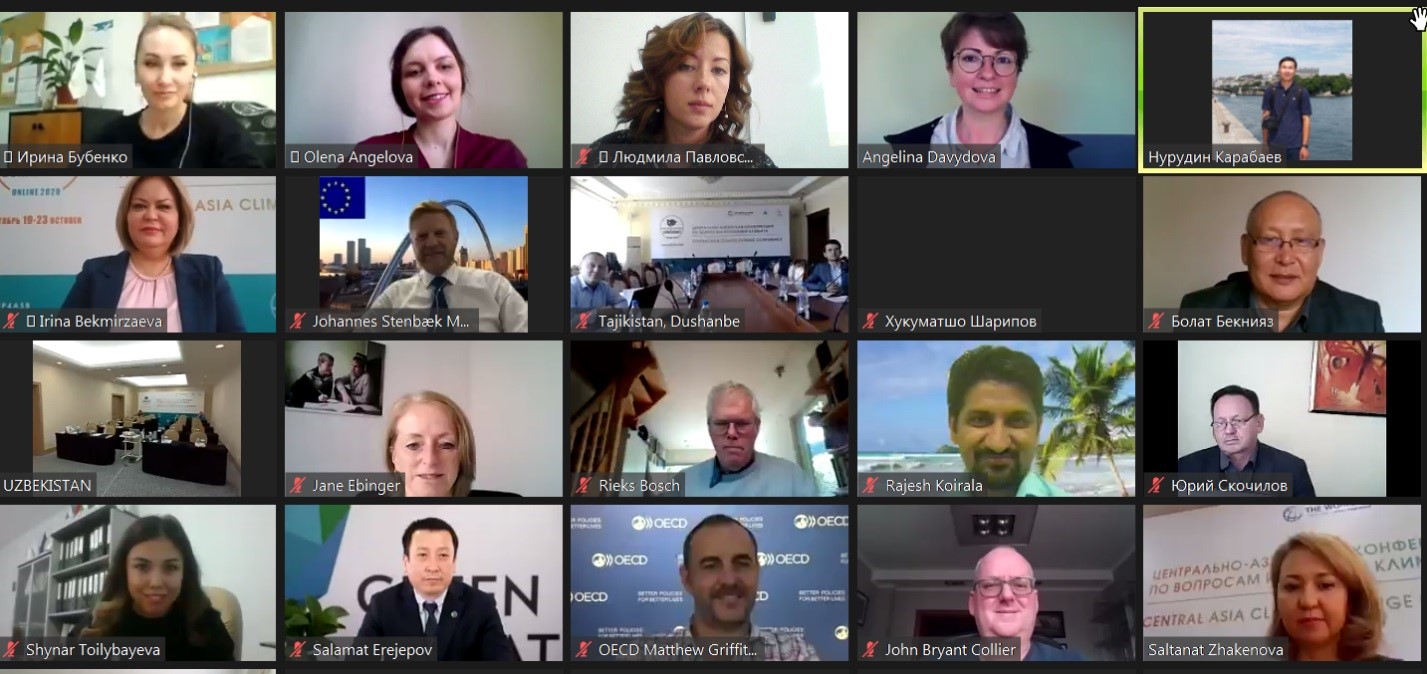
October 22, 2020, the Third Central Asian Conference on Climate Change (CACCC-2020) opened the discussion of climate finance which will last two days. The first day was on how international funds and initiatives are dealing with it. Climate finance was defined by the review of the Secretariat of the UN Framework Convention on Climate Change as “local, national or transnational financing—drawn from public, private and alternative sources of financing—that seeks to support mitigation and adaptation actions that will address climate change”.
In 2010 the UNFCCC Parties decided to establish the Green Climate Fund (GCF) which is playing a crucial role in serving the Paris Agreement and its temperature goal. GCF is the world’s largest dedicated fund helping developing countries reduce their greenhouse gas emissions and enhance their ability to respond to climate change.
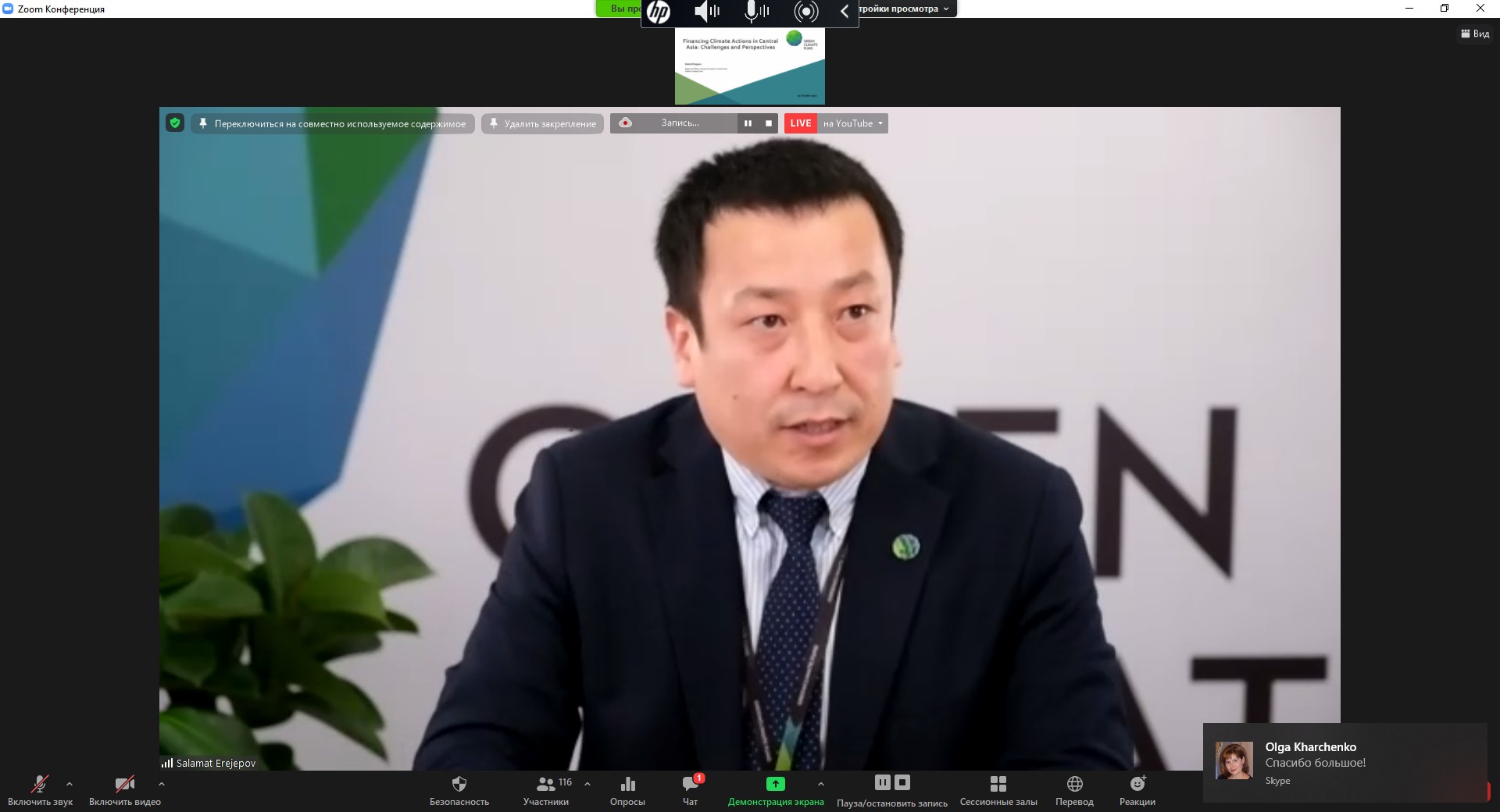
Mr. Salamat Erejepov, Regional Officer for Eastern Europe and Central Asia, Green Climate Fund, made the presentation “Financing climate actions in Central Asia: challenges and perspectives”. In his presentation Mr. Erejepov noted that the portfolio of the GCF portfolio includes 143 projects in the total amount of 6,2 bln USD 9 projects were approved on Central Asia in the total amount of 328 mln USD and out of them 6 projects in the total amount of 1,8 mln USD are at the implementation phase. He touched upon the funding by the Green Climate Fund based on country programs and national accredited entities. Mr. Erejepov also noted the rapid financial support by GCF, including for improvement of nationally determined contributions and green recovery from the global pandemic.
The World Bank is the world leaders of climate finance. For last five year the World Bank Group provide 83 bln USD for climate finance in developing countries. This international financial institute also promotes actively climate finance in Central Asian countries.

Ms. Jane Olga Ebinger, Sector Leader for Sustainable Development, World Bank made the presentation “Financing climate ambition in Central Asia in times of COVID-19”. In her presentation she noted that the global pandemic could reverse two decades of steady growth and poverty reduction in the region. Ms. Ebinger also noted that the number of poor people could increase for more than 3 mln due to the negative consequences of the global pandemic. She touched upon on the option of a green and climate-smart recovery from the consequences of the global pandemic. Ms. Ebinger presented the main directions of the support by the World Bank of the green recovery (a cleaner energy, circular economy, better landscape management, promotion of disruptive technologies) and approaches to their implementation. At the end of her presentation Ms. Ebinger mentioned that last 25 years we faced with a communications revolution, next 25 years will see an energy revolution and she posed the question “are we ready for it?”.
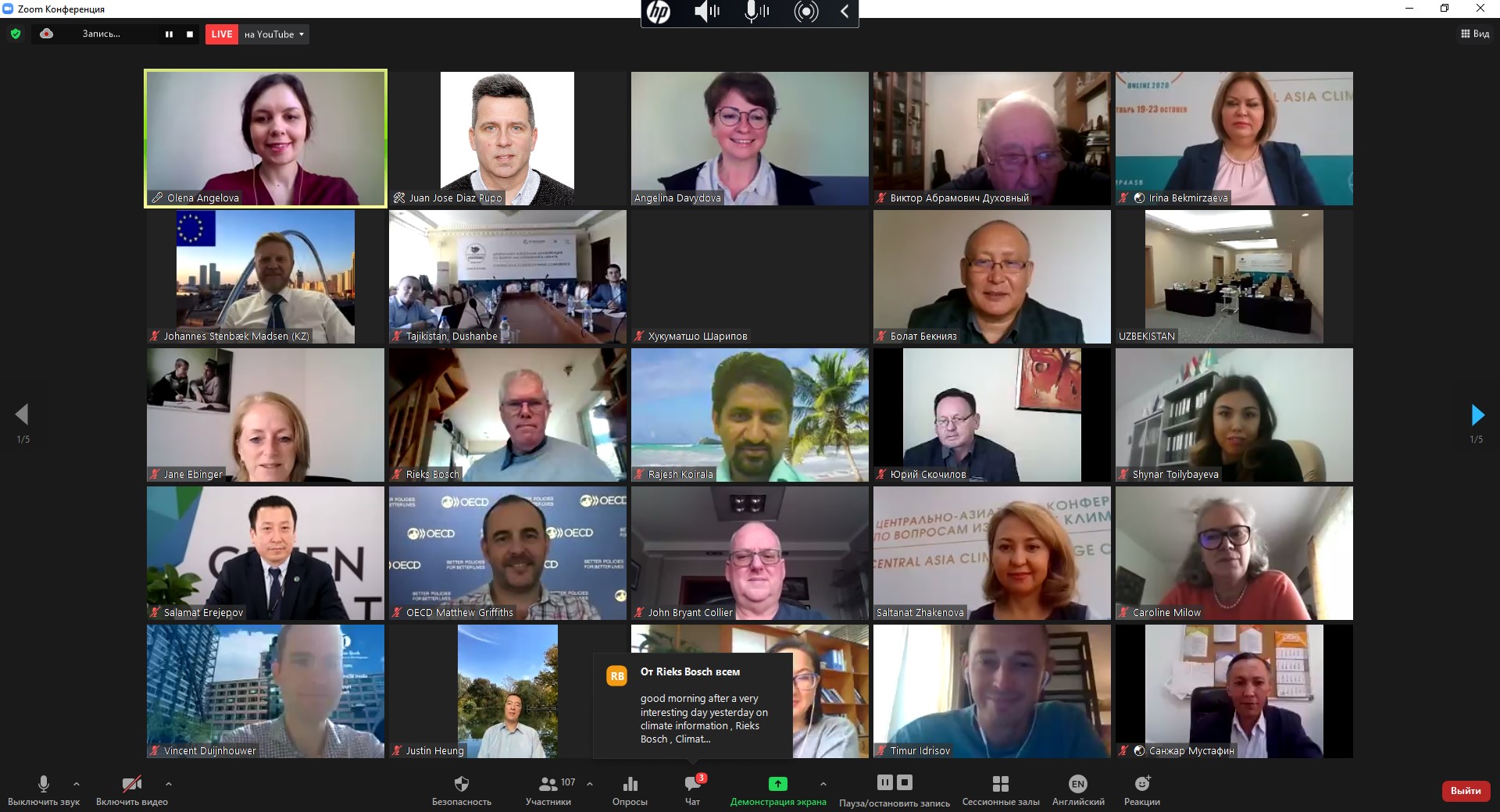
Climate change is key issue of the European Union policy, including the support of climate action in developing countries. The European Investment Bank set the 2020 targets to provide 25% of their total lending and 35% their lending in developing countries for climate finance. 2019, the amount of the climate finance by the European Investment Bank reached 19.3 billion EUR or 31% of all our financing. The Investment Facility for Central Asia (IFCA) is also dealing with climate finance.
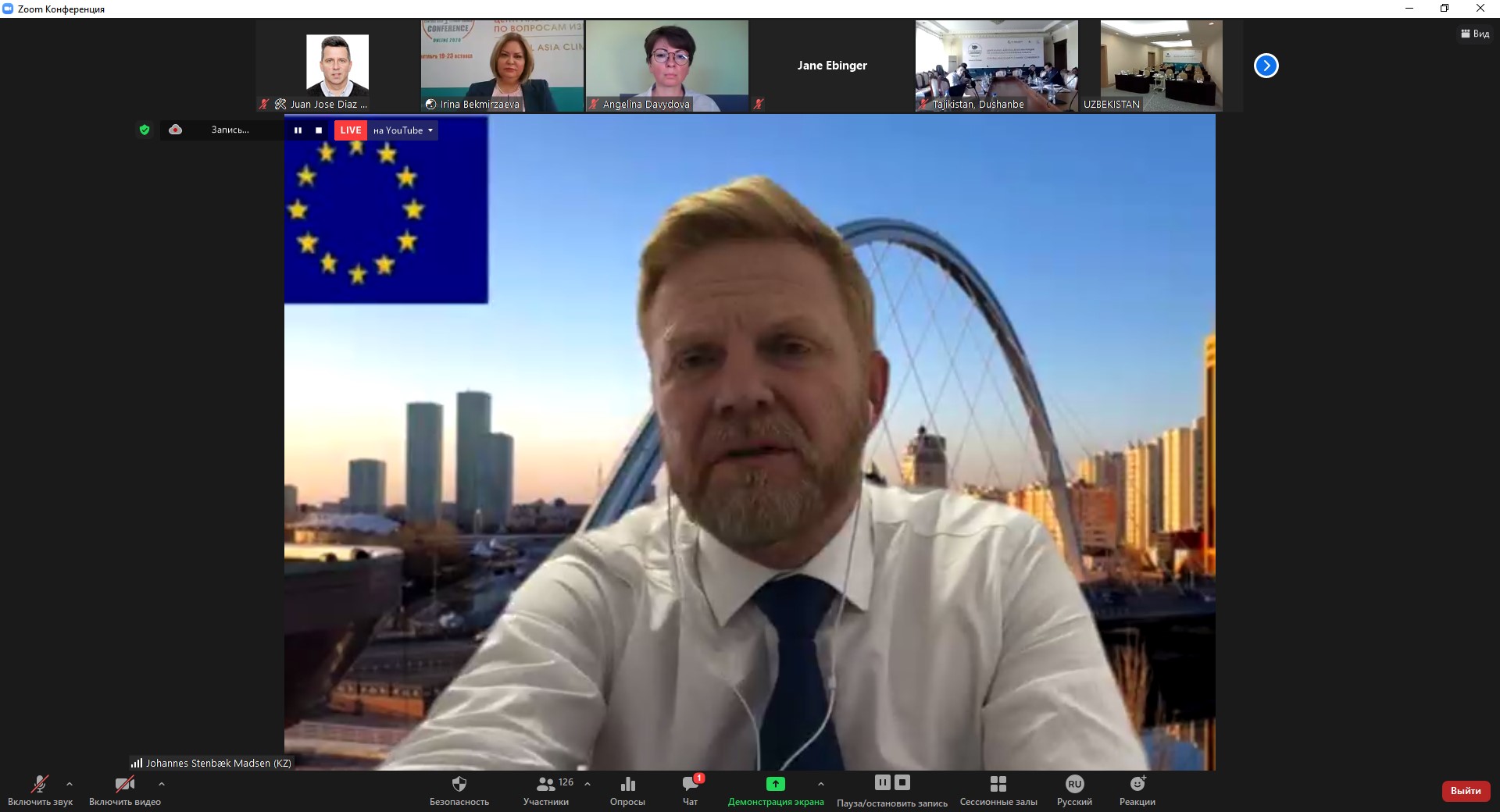
Mr. Johannes Stenbaek Madsen, Head of Cooperation, EU Delegation to Kazakhstan made the presentation “EU perspectives for investing in the climate change agenda in Central Asia”. Mr. Madsen noted at the beinning of his presentation that the European Union provided the support in the amount 120 mln. EUR to Central Asia to address the crisis with the global pandemic. He also noted the 2019 EU’s Central Asian Strategy and other strategic documents as the basis for climate finance in the region. Mr. Madsen touched upon on the EU climate finance in the region by the indication of relevant projects as well as investments by IFCA (the total grant budget for all areas of support is over 130 mln EUR).
In January 2020 the German Government launched the initiative “Green Central Asia”. This is the regional initiative on climate and security in Central Asia and Afghanistan. The aim of the initiative is to support a dialogue in the region on climate change and associated risks in order to foster regional integration between the six countries involved.
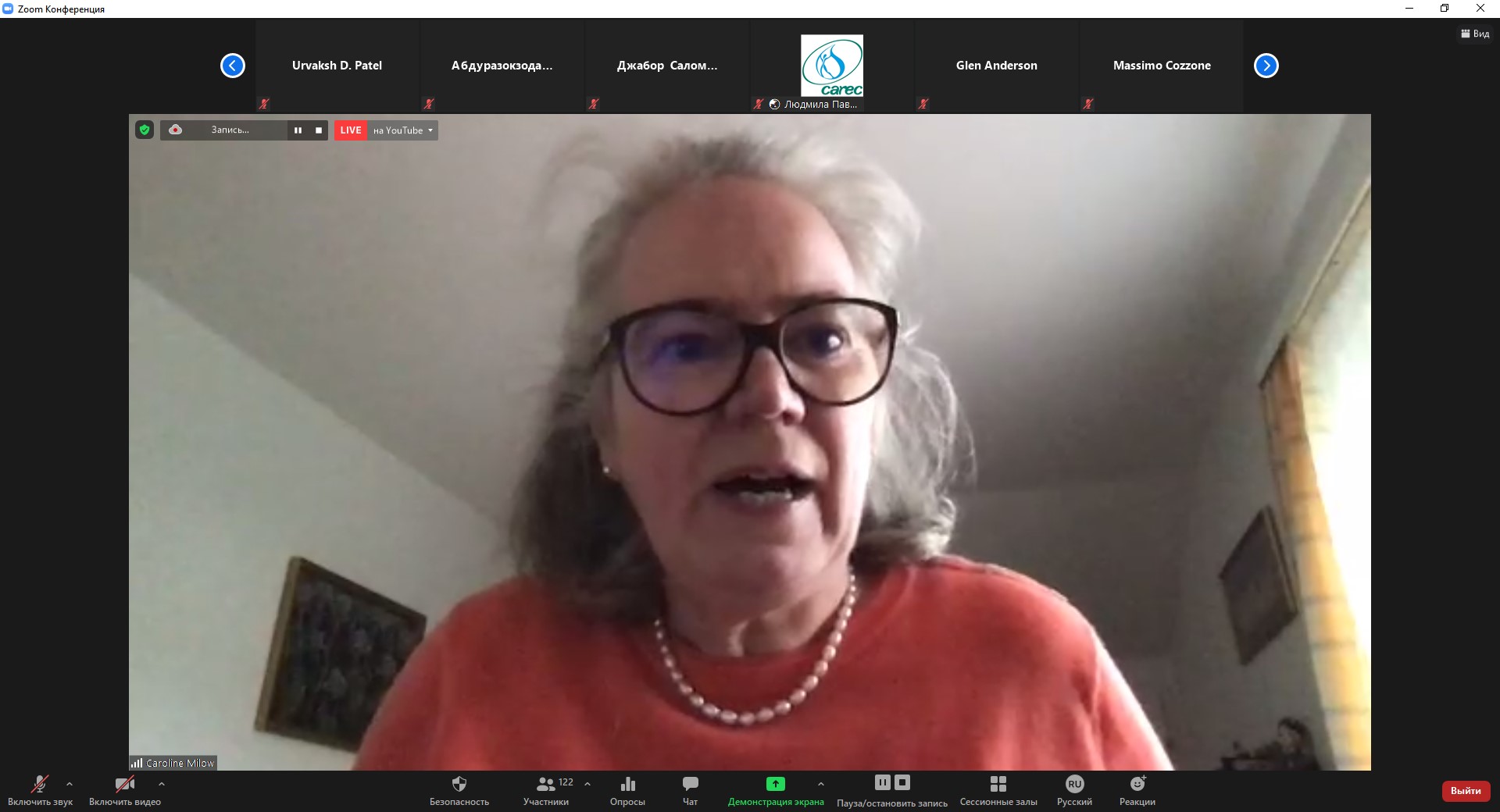
Ms. Caroline Milow, Programme Director of the “Green Central Asia”, presented the new initiative and noted that it is a platform for the regional dialogue in the region and better coordination of relevant projects supported by Germany in Central Asia. This initiative is planned for 4 years, until March 31 2024 and the German Federal Foreign Office provided the budget for it in the amount of 3,2 mln EUR. The target groups of this initiative include ministries of foreign affairs as well as institutions dealing with environmental protection and nature resources in Central Asia and Afghanistan. The planned activities cover policy consultations, exchange of information as well as green technology transfer with engagement of German companies. The last direction of the activities will be supported by German companies and cofinanced by the Federal Ministry for Economic Cooperation and Development (BMZ).

Climate finance is an important aspect of the activities of non-governmental organizations operating globally. They are a good source of the reviews and performance evaluation of climate finance. One of these organizations is Winrock International conducting over 140 projects on agricultural, environmental and social development in over 46 countries.

Mr. Glen Anderson, Senior Development Economist, Winrock International, made the presentation “Status of international funding for climate actions in Central Asia: gaps and opportunities”. In his speech Mr. Anderson noted that in 2017-2018 climate finance at the global level reached 579 bln USD and 95% of it was for climate mitigation. 35% of the climate finance were the financial support of developing countries by international financial institutions, international and donor organizations. Only 5% of the global climate finance was provided for climate adaptation and Mr, Anderson assessed the actual demand in investments for climate adaptation for the relevant period of time at the level 180 bln USD. Further he presented detailed information on the funding of Central Asian countries by the global funds dealing with climate finance. Mr. Anderson concluded his presentation by the findings on gaps of climate finance and proposals on how they can be closed.
In the course of further discussion on climate finance, CACCC 2020 participants also touched upon the engagement of private sector in climate investments, restructuring the economies of the Central Asian countries in accordance with their nationally determined contributions to the Paris agreement and on the basis of climate finance.

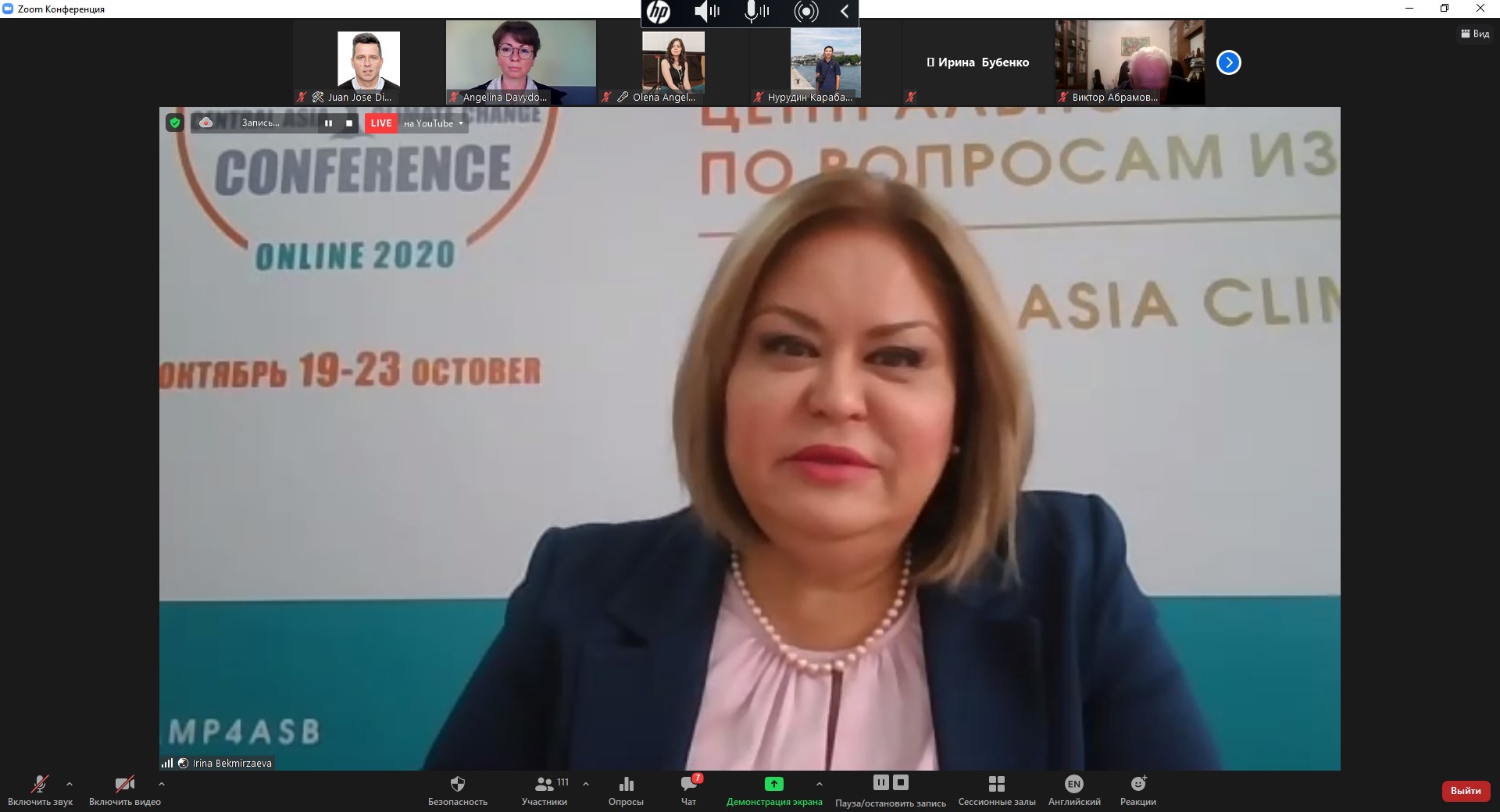
Based on the results of the fourth day of the conference, Ms. Irina Bekmirzaeva, Regional Coordinator, CAREC/CAMP4ASB, summed up the results and emphasized the following key messages:
- FIRST. International funds represented by the GCF and GEF have seen certain progress over the past year in approving applications from Central Asian countries to the Preparedness Program (up to 3 million). At the same time, there is a need to continue taking steps in order to increase access to large-scale climate-related projects in the region.
- SECOND. It is important to understand the specifics of international climate funds and their strategic development during the pandemic. It is necessary to strengthen collaboration with international and regional organizations, which can assist in attracting funding to regional and national projects on climate change.
- THIRD. International assistance in the form of regional initiatives and support of dialogue platforms on climate change and related areas (‘green’ technologies, effective natural resource management, etc.) is essential for countries in Central Asia, particularly from the stand-point of improving national policies, information exchange, and capacity building.
The presentations of the CACCC-2020 speakers can be found at the following link: http://gofile.me/3xIiD/hId9gulpD
Climate Adaptation and Mitigation Program for Aral Sea Basin or CAMP4ASB is implemented by CAREC and financed by the World Bank. Project aims to enhance regionally coordinated access to improved climate change knowledge services for key stakeholders (e.g., policy makers, communities, and civil society) in participating Central Asian countries as well as to increased investments and capacity building that, combined, will address climate challenges common to these countries.CAMP4ASB is implemented in Kazakhstan, Tajikistan, Turkmenistan and Uzbekistan during the period from 2016 to 2021.

